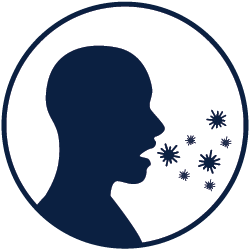Influenza

The flu is a contagious respiratory illness caused by influenza viruses that infect the nose, throat, and lungs. It can cause mild to severe illness, and at times can lead to death.
The best way to prevent the flu is by getting a flu vaccine. For more information go to key facts.
Signs and Symptoms of Flu
- Fever* or feeling feverish/chills.
- Cough.
- Sore throat.
- Runny or stuffy nose.
- Muscle or body aches.
- Headaches.
- Fatigue. (very tired)
- Some people may have vomiting and diarrhea, though this is more common in children than adults.
How Flu Spreads
- Most experts believe that flu viruses spread mainly by droplets made when people with flu cough, sneeze or talk. These droplets can land in the mouths or noses of people who are nearby. Less often, a person might also get flu by touching a surface or object that has flu virus on it and then touching their own mouth, eyes or possibly their nose.
- Period of Contagiousness
- You may be able to pass on the flu to someone else before you know you are sick, as well as while you are sick. Most healthy adults may be able to infect others beginning 1 day before symptoms develop and up to 5 to 7 days after becoming sick. Some people, especially young children and people with weakened immune systems might be able to infect others for an even longer time.
- What you can do to limit the spread of germs and prevent infection
- Avoid close contact with people who are sick. When you are sick, keep your distance from others to protect them from getting sick too.
- If possible, stay home from work, school, and errands when you are sick. You will help prevent others from catching your illness.
- Cover your mouth and nose with a tissue or the inside of your arm when coughing or sneezing. It may prevent those around you from getting sick.
- Washing your hands often will help protect you from germs.
- Avoid touching your eyes, nose or mouth. Germs are often spread when a person touches something that is contaminated with germs and then touches his or her eyes, nose, or mouth.
- Practice other good health habits. Get plenty of sleep, be physically active, manage your stress, drink plenty of fluids, and eat nutritious food.
Last updated: 2/2/2021
